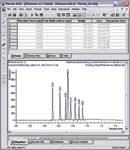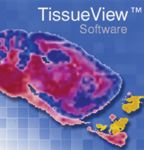Digital Update
Add-on instrument control available; Software for mass spectrometry imaging; GC–MS reprocessing software; Software for multi-channel pipette calibration process
Add-on instrument control available
Thermo Fisher Scientific has announced the release of add-on instrument control software for its Accela high speed LC, providing integrated instrument control, digital data acquisition, chromatography data processing and reporting.

The Atlas Chromatography Data System (CDS) integrates full instrument control and chromatography data handling for the Accela high-speed pump, autosampler and PDA detector and it is designed to merge the rapid data analysis, processing and reporting of Atlas with the high-speed separations of the Accela. Additionally, the company's high-speed LC system features sub-2 micron particle columns and can reportedly operate at the standard pressures of conventional HPLC to 15000 psi.
This CDS add-on software provides a scalable client/server environment for laboratory LAN and WAN networks in pharmaceutical drug development, discovery, QA/QC laboratories, academia and the food and beverages industries. It has been designed as a multi-user, multi-instrument data system and it reportedly enables remote network access to any Accela so that its data can be fully collected, secured and protected. Furthermore, the company states that the Atlas software provides seamless integration of Accela results with enterprise wide laboratory informatics management systems applications including the company's full range of LIMS.
For more information on this add-on software contact the company at analyze@thermo.com or visit the website at www.thermo.ccom/lc
Software for mass spectrometry imaging
Applied Biosystems has released software to reportedly improve mass spectrometry imaging (MSI).

The TissueView software offers intuitive data processing and is claimed to deliver easy-to-interpret research results so users gain a good understanding of how drugs and proteins are distributed within biological tissue. The company states that this application gives researchers a way to process, visualize and interpret information that is suitable in aiding pharmaceutical companies in selecting appropriate drug compounds for development as well as helping academic researcher to learn more about biological functions and advance molecular histology.
Furthermore, this software is claimed to be particularly suitable for large MCI studies across multiple platforms and has the ability to process data from the company's Voyager DE-STR, QSTAR Elite system, 4700 Proteomics Discovery system and 4800 MALDI TOF/TOF analyser platforms.
For more detailed information on this products visit the Applied Biosystem's website at http://europe.appliedbiosystems.com
GC–MS reprocessing software
Markes International has announced the global distribution of its GC–MS reprocessing software package.

ClearView reprocesses stored GC–MS data files allowing the quantitative and qualitative analysis of trace compounds in real world samples. The software package is complementary to the company's portfolio of analytical thermal desorption (TD) instrumentation for GC–MS analysis of trace toxic and odorous compounds in air and materials.
The company reports that the software uses a dynamic background compensation (DBC) algorithm to distinguish between chromatographic peaks and GC-background/baseline anomalies in stored GC–MS data files, leaving the original data files intact and unaffected.
Additionally, this software allegedly works on most standard GC–MS data file formats, details of applicable file formats can be obtained from the company. Furthermore, files can be processed individually or as a batch for efficiency and it is reported that processing takes seconds per file.
For further information on this product visit the company's website at www.markes.com
Software for multi-channel pipette calibration process
Labtronics has announced the addition of software to its pipette tracker product range.
The Pipette Tracker Pro1 edition is reported to add support for direct interfaces with SpeedCal or MCP multi-channel pipette calibration weighing systems, which is claimed to save time on pipette calibrations.
This addition connects and controls the Sartorius SpeedCal through an RS232 interface to automatically activate, tare and light up the channels on the balance indicating which positions to dispense the next sample into. After pressing the OK button the channel weight data is recorded at the same time and automatically converted to the correct volume. Additionaly, pipette models from 1 to 64 channels can be calibrated using the software to guide the user through the pipette calibration process.
Additionally, the software can be used to connect up to 5 Mettler MCPs simultaneously and allegedly prompt the user when to move the next sample to the next balance, cycling through all channel's volume samples until finished.
Furthermore, this system interfaces with a wide range of manufacturers balances and performs calculations and corrections as required by ISO/EN 8655 and ASTM 1154 for pipette calibration.
For further details on this product or an on-line demonstration contact di-sales@labtronics.com or visit the company's website at www.labtronics.com
New Study Reviews Chromatography Methods for Flavonoid Analysis
April 21st 2025Flavonoids are widely used metabolites that carry out various functions in different industries, such as food and cosmetics. Detecting, separating, and quantifying them in fruit species can be a complicated process.
Quantifying Terpenes in Hydrodistilled Cannabis sativa Essential Oil with GC-MS
April 21st 2025A recent study conducted at the University of Georgia, (Athens, Georgia) presented a validated method for quantifying 18 terpenes in Cannabis sativa essential oil, extracted via hydrodistillation. The method, utilizing gas chromatography–mass spectrometry (GC–MS) with selected ion monitoring (SIM), includes using internal standards (n-tridecane and octadecane) for accurate analysis, with key validation parameters—such as specificity, accuracy, precision, and detection limits—thoroughly assessed. LCGC International spoke to Noelle Joy of the University of Georgia, corresponding author of this paper discussing the method, about its creation and benefits it offers the analytical community.











